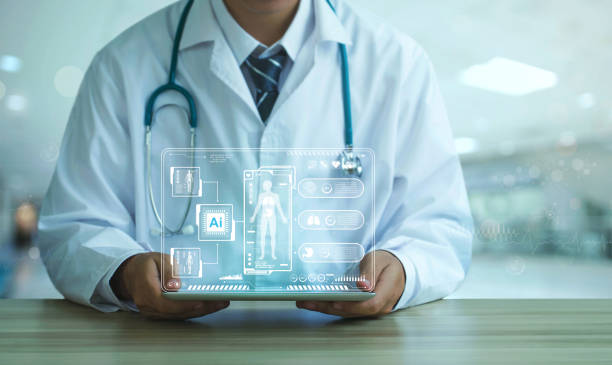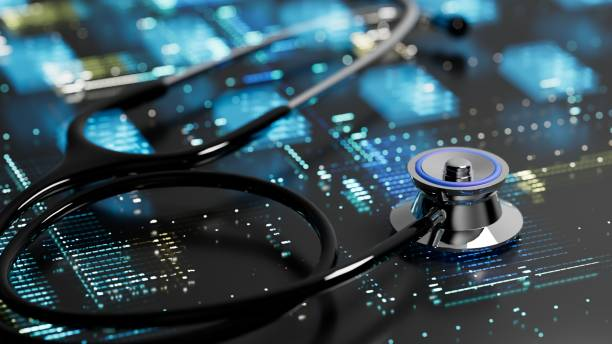
AI stands for artificial intelligence. In the past few years, AI has become an important part of health care. In healthcare, the transformation of AI is wonderful. It can diagnose the disease, treat it, and prevent the patient from it. It enhances patient care and operational efficiency.
AI resolves many medical issues that professionals face.
As it is the era of technology. It is increasing rapidly day by day.AI is playing a very critical role in saving lives and reducing costs.
Explore the role of AI in healthcare, transforming diagnosis, treatment, and patient care through advanced technologies and data-driven medical solutions.
AI in Healthcare Improving Diagnosis Accuracy
AI is quickly transforming healthcare—one of the most well-known ways that AI is transforming healthcare is through increased accuracy of diagnoses. Machine learning algorithms, a type of AI, can analyze large datasets of data (e.g., medical imaging images, histories, results, etc.) to detect patterns that human doctors would not be able to see.
For example, AI imaging tools are used to reveal early evidence of a disease such as cancer, heart disease, or neurological dysfunction. Studies have even shown AI models to be better than radiologists at detecting anomalies on X-rays, MRIs, or CT scans—these sophisticated models help doctors diagnose patients sooner and more accurately. AI fast data processing makes the process of accurately diagnosing a patient quicker for doctors. This is particularly relevant in situations where time is of the essence (e.g., stroke diagnosis, trauma care, sepsis detection, etc.)—AI provides diagnostic value in a timely manner!

Role of AI in Healthcare Personalized Treatment Plans
The Role of AI in Healthcare is also progressing these days in tailoring patient care. Every patient is distinct, and AI can help produce a care plan that is personalized based on a patient’s genetics, habits, and prior medical history.
Artificial intelligence -powered tools are designed to analyze data from clinical trials, electronic medical records, and patient demographics to recommend the treatments that would be most effective based on the patient’s likelihood of benefit.
For example, AI is used in the treatment of cancer. AI is utilized to diagnose and treat cancer. It recommends that the therapist undergo such treatment, which has the maximum possibility of success and also prevents things that can cause some negative effects on the patient’s body. Thereby improving patient quality of life.
preventing and prediction
AI is facilitating predictive healthcare by identifying individuals at risk of certain conditions even before symptoms arise. AI can analyze data sets, including electronic health records, to develop a forecast of potential risks for something as high as diabetes, heart disease, or certain cancers. These AI capabilities are immensely powerful in regard to preventive health, as they enable the provider to take interventions to avert many chronic health conditions through lifestyle changes, medications, or other preventive measures.
For example, AI systems are frequently used to predict the disease effects and give some solutions to prevent it. AI systems give information about which patient is going into recovery and which patient is not being recovered. These predictions can help the medical professional in treatment.
Enhance Operational Efficiency
In addition to being directly involved in patient care, Smart technology also helps with the administrative and operational aspects of healthcare.
AI tools are being used to help with order scheduling, billing, and other time-consuming responsibilities, which allow healthcare providers to concentrate on patient care.
AI has even helped with hospital bed management, staff scheduling, and resource allocation, which helps alleviate wait times, improve patient outcomes, and lower healthcare costs.
Enhance mental health care.
Advancing Mental Health Treatment AI is progressing in mental health care as well, where early detection and continuous tracking can make a significant impact.
The Role of AI in Healthcare enhanced applications are being used to evaluate and monitor information about patients’ mental health, conducting everything from monitoring moods to evaluating speech and behavior in real time over video.
Conclusion:
There is no doubt that AI is transforming healthcare. AI is used to enhance the accuracy of treatment, fast treatment, and customized treatment. AI has the potential to save lives, make medical care more affordable, and improve care. In the future, we would expect many future developments in AI machine learning in the fields of medicine that improve health, ultimately resulting in a higher quality of life for longer-living people throughout the world.
FAQS:
What is Artificial Intelligence (AI) in healthcare?
In past few years,the AI become an important part of health care.in healthcare the transformation of AI is very wondering.
It can diagnose the disease, treat it, and prevent the patient from it.
It enhances patient care and operational efficiency.
AI resolves many medical issues that professionals face.
Can AI help in preventing diseases?
Yes, AI is very helpful for preventing diseases. It can help by predictive analysis, early detection, and vaccine development.
Is AI able to replace doctors in healthcare?
AI is the tool that aid healthcare professionals, but it is not a means to replace the doctor. It works like a colleague who can help in decision making and help in better treatment.

